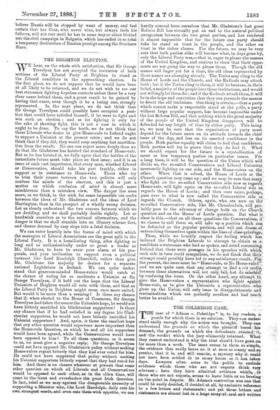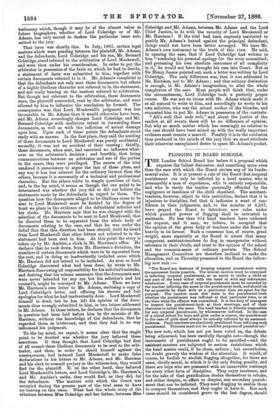• THE COLERIDGE CASE., r E ease of 44 Adams v.
Coleridge" is, to lay readers; a. puzzle for which there is no solution. Thep can under-, stand easily -enough why the-action was brought. They can understand the grounds on which the plaintiff based his demand, :the 'grounds on which the defendants resisted it, and. the verdict which the jury ultimately returned. What they cannot understand is why the trial should have gone on for more than a week. The home seems to them so simple, the evidence that really bears- on it at once so scanty and so precise' that it is, and will remain, a Mystery why it could not lictve been settled in as many hours as it itim taken days. Lawyers often seem to the • public to exelmle evidence which those who are riot experts thialp velly relevant-; here they have admitted- evidence whleh; to those who are not experts, seems to have little or no bearing on the.point in dispute. Mr. Adams's contention was one WA could be easily decided, if decided- at all, by exclusive miaow to a few letters and statementa; and yet these letters rand statements axe almost lost in a huge.arrar_ofpural. aid wri4140 testimony which, though it may be of the utmost value to future biographers, whether of Lord Coleridge or of Mr. Adams, has only served to darken the particular issue sub- mitted to the jury.
That issue was shortly this. In July, 1885, certain legal matters which were pending between the plaintiff, Mr. Adams, and the defendants, Lord Coleridge and his son, Mr. Bernard Coleridge, stood referred to the arbitration of Lord Monkswell, and were then under his consideration. In order to put the arbitrator in possession of the facts on which he had to decide, a statement of facts was submitted to him, together with certain documents referred to in it. Mr. Adams's complaint is that the defendants not only sent these documents, but others of a highly libellous character not referred to in the statement, and not really bearing on the matters referred to arbitration. But though not relevant to the arbitration, these documents were, the plaintiff contended, read by the arbitrator, and were allowed by him to influence the conclusion he formed. The consequence was that Lord Monkswell's judgment was less favourable to Mr. Adams than it would otherwise have been, and Mr. Adams accordingly charges Lord Coleridge and Mr. Bernard Coleridge with malicious intent in forwarding these documents, as well as with the infliction of actual damage upon him. Upon each of these points the defendants stood ready with an answer. In the first place, they said the sending of these documents to Lord Monkswell was purely accidental ; secondly, it was not an accident of their causing ; thirdly, these documents, when sent, had exercised no influence what- ever on the arbitrator's decision ; and fourthly, that being communications between an arbitrator and one of the parties to the cause, they were privileged. The course of the trial rendered it unnecessary to argue the last of these pleas, and any way it has less interest for the ordinary layman than the others, because it is necessarily of a technical and professional character. But the others relate to simple questions of fact, and, to the lay mind, it seems as though the one point to be determined was whether the jury did or did not believe the statements made by the defendants in regard to them. The question how the documents alleged to be libellous came to be sent to Lord Monkswell must be decided by tha degree of trust we place in the evidence of the defendants' solicitor and his clerks. Mr. Harrison says that he was charged with the selection of the documents to be sent to Lord Monkswell, that he directed them to be separated from the whole body of documents relating to the case, and that he was under the belief that that this direction had been obeyed, until he heard from Lord Monkswell that other letters not referred to in the statement had been sent to him. At this point the story is taken up by Mr. Ambler, a clerk in Mr. Harrison's office. He declares that he took down, from Mr. Harrison's dictation, the numbers of certain documents which were to be separated from the rest, and in doing so inadvertently included some which Mr. Harrison did not intend to be included. As soon as Lord Coleridge discovered what had been done, he wrote to Mr. Harrison disavowing all responsibility for his solicitor's mistake, and desiring that his solemn assurance that the documents sent were never intended for any eye but his solicitor's and his counsel's, might be conveyed to Mr. Adams. Then we have Mr. Harrison's own letter to Mr. Adams, enclosing a copy of Lord Coleridge's letter, and offering his sincere and full apologies for what he had inadvertently done. Lord Monkswell himself is dead, but he has left his opinion of the docu- ments thus wrongly submitted to him, in two letters addressed to Mr. Adams. In these letters, he declares that the documents in question had been laid before him by the mistake of Mr. Harrison, without the knowledge of the defendants, that he regarded them as irrelevant, and that they had in no way influenced his judgment.
To the lay mind, we repeat, it seems clear that the single point to be decided was whether the jury believed these assertions. If they thought that Lord Coleridge had first of all caused these libellous documents to be sent to the arbi- trator, and then, in order to shield himself against the consequences, had induced Lord Monkswell to make false declarations in his letters to Mr. Adams, and Mr. Harrison and his clerk to commit perjury in the witness-box, they would find for the plaintiff. If, on the other hand, they believed Lord Monkswell's letters, and Lord Coleridge's, Mr. Harrison's, and Mr. Ambler's oaths, they would find, as they did, for the defendants. The matters with which the Court was occupied during the greater part of the trial seem to have no bearing on this issue. What had the whole story of the relations between Miss Coleridge and her father, between Miss Coleridge and Mr. Adams, between Mr. Adams and the Lord Chief Justice, to do with the veracity of Lord Monkswell or Mr. Harrison If the trial had been expressly instituted to gratify Mr. Adams's hatred against the principal defendant, things could not have been better arranged. We have Mr. Adams's own testimony to the truth of this view. He said, in opening the case, that if Lord Coleridge had written to him "tendering his personal apology for the error committed, and protesting his own absolute innocence of all complicity in it," he would not have brought his case into Court. But as Sir Henry James pointed out, such a letter was written by Lord Coleridge. The only difference was, that it was addressed to Mr. Harrison, not to Mr. Adams ; and this solitary distinction is enough, in Mr. Adams's imagination, to alter the whole complexion of the case. Most people will think that, under the circumstances, Lord Coleridge took a perfectly proper course. He was not on terms with Mr. Adams which made it at all natural to write to him, and accordingly he wrote to his own solicitor, who was the actual author of the blunder, and requested him to put Mr. Adams in possession of the contents.
"All's well that ends well," and about the justice of the verdict at all events there will be no difference of opinion. But why so much matter which has seemingly no relation to the case should have been mixed up with the really important evidence must remain a marvel. Possibly it is to the confusion thus produced in the minds of the jury that we must attribute their otherwise unexplained desire to spare Mr. Adams's pocket.







































 Previous page
Previous page